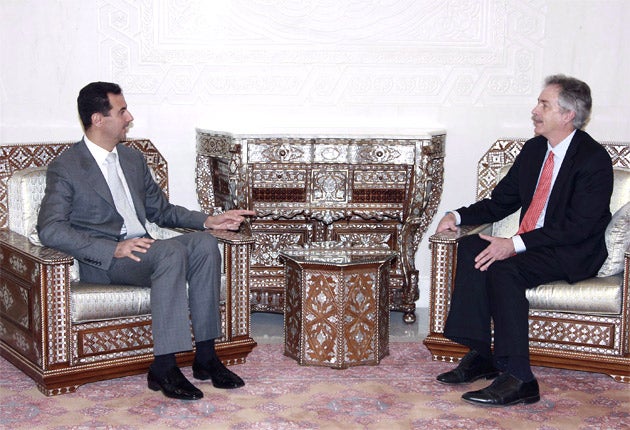Obama courts Damascus in hope of ending Middle East deadlock
Assad goes from pariah to ally as US breaks five years of diplomatic isolation for Syria

As Barack Obama moved formally to repair US relations with Syria by nominating an ambassador to serve there after a five-year hiatus, William Burns, America's top career diplomat, held talks in Damascus yesterday with the Syrian leader Bashar al-Assad on an array of security issues in the region.
The sudden flurry of activity reflects a gamble by Washington that engaging more closely with Syria it can persuade it to take steps on a number of fronts that it sees as being vital to improving stability in the Middle East with regard to all its neighbours – Iran, Iraq, Lebanon as well as Israel.
Emerging from his meeting with President Bashar, Mr Burns said the nomination of Robert Ford, a top Arabist at the US State Department, confirmed "America's readiness to improve relations and to cooperate in the pursuit of [a] just, lasting and comprehensive peace between Arabs and Israelis".
The last American ambassador in Damascus was withdrawn by the Bush administration in 2005 in the wake of the assassination in Beirut of Rafic Hariri, the former Lebanese Prime Minister. Many countries accused Syria of being involved in the attack which killed 22 others but Damascus denied it.
Mr Obama campaigned on a promise to renew dialogue with old enemies and Washington was moving even last summer towards restoring an ambassador to Syria. As part of the rapprochement, George Mitchell, Mr Obama's Middle East peace envoy, has also been there at least twice. Newspapers in Damascus reported last week that the country had indicated its approval of a new US ambassador.
The nomination of Mr Ford, who is currently the deputy ambassador in Iraq and served as the US ambassador to Algeria from 2006-2008, needs to be approved by the US Senate and there were the first rumblings of dissent yesterday from members of the Republican Party.
"With this nomination, our foreign policy again risks sending the message that it is better to be an intractable enemy than a co-operative, loyal US ally," complained Ileana Ros-Lehtinen, the top Republican on the House of Representatives foreign affairs committee.
The new embrace of Syria is only likely to go so far, however, with suspicions still plain on both sides. The US continues to believe that Syria gives support to Hamas and Hizbollah, two Islamic militant and political groups that Washington continues to categorise as terrorist organisations.
Indeed last May, President Obama renewed US sanctions against Syria, accusing it again of supporting terrorism as well as seeking weapons of mass destruction and destabilising peace in Iraq.
Mr Burns, who was the quiet architect of the rehabilitation of Colonel Gaddafi of Libya, once himself a prime enemy of the US, admitted that nothing will be easy going forward.
"I have no illusions about the challenges," he told reporters. "But my meeting with President Assad made me hopeful that we can make progress together in the interest of both of our countries."
Talks were also set for later yesterday between Mr Burns and Walid Muallem, the Syrian Foreign Minister. Daniel Benjamin, the State Department's top official on counter-terrorism, was meanwhile scheduled to remain in Syria for meetings with his counterparts.
While the anti-US enmity may run deep in Syrian society, the country has reasons of its own to seek an improved level of dialogue. The years of economic sanctions by the US continue to hurt its economy. Meanwhile, the US could assist in persuading Israel finally to hand back the Golan Heights seized in the 1967 war. The Golan remains one of the issues snagging a wider Middle East peace deal.
Robert Gibbs, the White House spokesman, said that if he is confirmed by the Senate, Ambassador Ford will "engage the Syrian government on how we can enhance relations, while addressing areas of ongoing concern".
In from the cold: Sanctions and Syria
May 2004 President George W Bush imposes sanctions on Damascus. The administration cites Syrian support for terrorism and brands the country an "outpost of tyranny".
February 2005 Lebanese Prime Minister Rafic Hariri is assassinated. Syria is accused of involvement (which it denies) and Washington withdraws ambassador from Damascus.
May 2009 President Obama renews economic and diplomatic sanctions.
February 2010 Obama formally nominates Robert Ford as the new ambassador to Syria and top diplomat William Burns is dispatched to meet President Assad.
Join our commenting forum
Join thought-provoking conversations, follow other Independent readers and see their replies
Comments
Bookmark popover
Removed from bookmarks